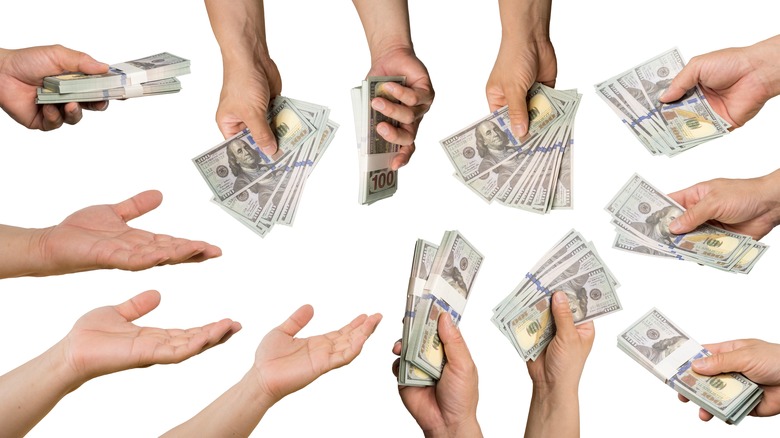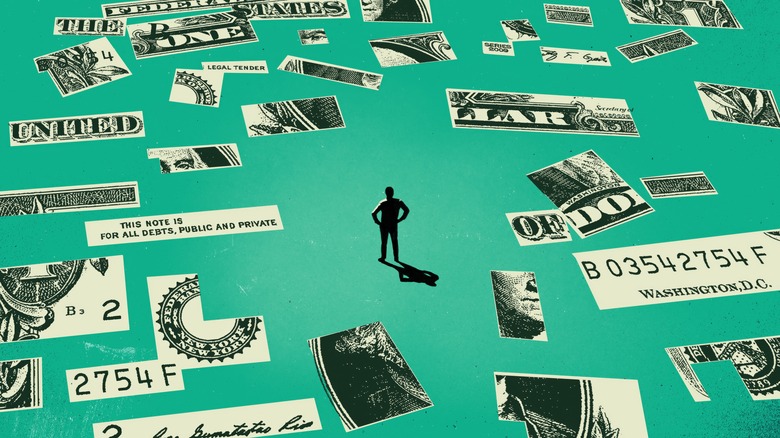Expert Reveals What You Should Never Do If You Win The Lottery
We may receive a commission on purchases made from links.
We've all heard the story by now: Someone strikes it big in the lottery, wins a billion-quadrillion bucks, and somehow blows every last penny. And time and again, everyone asks, "How? How is it possible to blow a billion-quadrillion bucks?" Could it be that folks who play lotteries have no clue how to manage their winnings if they've never had tons of money before? Do lottery winners, in the throes of monetary ecstasy, lose sight of good judgement regarding how to use their earnings? Do they become the targets of deceit and violence? The short answer is: Yes.
According to the Associated Press, Suzanne Mullins won $4.2 million in 1993 (more than $9 million when adjusted for inflation) and wound up with $47,000 per year after splitting the winnings with her husband and daughter, and then lost her winnings paying for her son-in-law's medical bills. After Ibi Roncaioli won the $5 million in the lottery in 1991, her husband Joseph found out that she gave $2 million to a kid he never knew she had, and "squandered" the money instead of setting them up for retirement and he killed her, per the Toronto Star. William Post won $16.2 million in 1988 and his brother hired a hitman to kill him, which was just one of several negative outcomes of Post's lucky winning ticket described by The Washington Post.
So, what is Chief Credit Analyst at Lending Tree, Matt Schulz's, take on what to do and not do if you win the lottery? Grunge reached out to the writer of "Ask Questions, Save Money, Make More: How to Take Control of Your Financial Life" for advice. His tips were simple: Get financial advice and tell no one.
Top tip #1: Keep your win close to the vest
It's likely that the very first thing a lottery winner would want to do is tell people about their good fortune. The winner would jump up and down, shout to the hills, hug someone, maybe cry, envision all of their dreams emerging and their woes disintegrating, and so forth. And because it's the 21st century, some people might grab their phones first to blab about it online and get loads of attention, particularly on social media. Naturally, social media and the internet age makes lottery winners even more vulnerable than before.
On this note, Credit Analyst Matt Schultz's top tip is easy: "You definitely, definitely, definitely should not tell everyone. Nothing brings out the fraudsters and scumbags like lottery winnings." Calling out social media specifically, he says, "Do not post about your success on social media." And unless someone is into being catfished or dug for gold, Schultz adds, "Do not brag about it on dating apps."
Rather, Schultz advises laying low and telling the smallest amount of people possible, like "your immediate family and your closest friends and relatives," but not, "the guy in accounting or that cousin who always gave you the ick." And unless you want to get kidnapped and ransomed, "Do not go down to your local bar and buy drinks for everyone to announce your big win." Minimally, Schultz even advises changing your phone number and go-to email address.
Top tip #2: Get proper financial advice
For some people, keeping your mouth shut might be just as tough as developing a proper financial plan. But the latter, as Credit Analyst Matt Schultz told Grunge, is just as important as the former. The reader need not even think beyond the handful of examples we cited earlier that involve impulsive and destructive financial choices, or even only a lack of general literacy regarding handling such an enormous and sudden influx of funds.
Schultz says that receiving proper financial advice is critical for such "life-changing money" lest the winner risk blowing the whole thing like so many other lottery winners before. He recommends "connecting with a fee-only financial adviser," aka, not someone who gets paid by commission but rather on a per-service basis. Schultz particularly says that an adviser who works with "high-net-worth clients" is better than not. Plus, if you've got all that extra money coming in, it wouldn't be a bad idea to get a lawyer involved in the mix, too.
Finally, a lottery winner need not go with the first adviser they contact. It's okay to take your time, shop around, think a bit, and don't make a hasty decision regarding advisers or financial plans — much like making hasty, off-the-cuff purchases with winnings. Celebrating is fine, splurging is fine, but as Schultz wisely says, "even that should be done planfully." In other words and in summation: Spurious decisions would never be worth it if they waste a once-in-a-lifetime monetary windfall.


